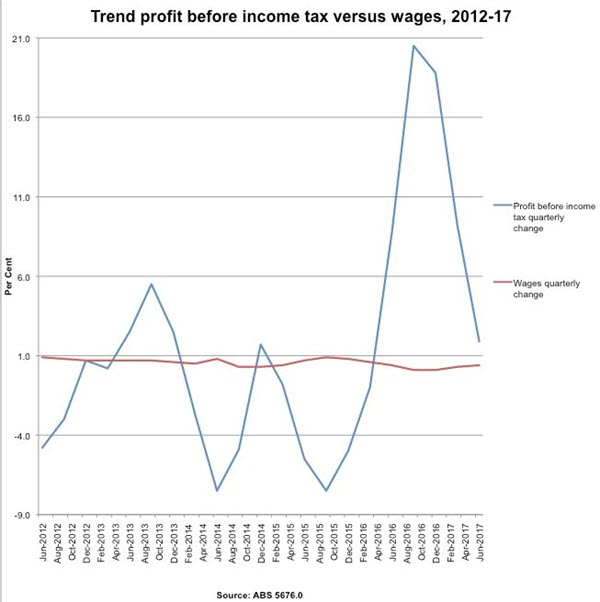
Treasurer Scott Morrison continues to insist that wages growth will return soon because it is directly linked to corporate profits. “Investment leads to the profits which leads to the wages growth,” Morrison told 7.30 two weeks ago. He repeated the claim yesterday, telling Insiders “as their profits improve, then obviously the case for wage rises obviously builds”.
It’s the same line as peddled by Grant King of the Business Council (and nowhere else currently), who told one of those sublimely awful AFR round tables a few weeks back that Australians wouldn’t be getting a pay rise until corporations were making more money, thank you.
Well, let’s put that to the test by looking at how company profits have performed versus wages, using data from the Australian Bureau of Statistics’ Business Indicators (this is different to the Wage Price Index survey, but let’s compare like with like as much as possible). Does there appear to be any correlation between profits and wages to you?
In fact it’s becoming increasingly obvious that if there is a link between profits and wages it’s a negative one. In the United States, wages have grown by more than in Australia, but still remain relatively weak and growth has fallen this year. That’s despite the US enjoying what has been frequently termed a “golden era” of corporate profits. In the UK, company profits have grown consistently since 2009 — and for most of that period, UK real wages fell (they’re now falling again, despite another lift in profits this year).
Why would there be a link between higher profits and power wages? Two reasons are obvious: one of the key drivers of higher profits have been corporations exploiting more employer-friendly and union-hostile industrial relations laws to curb wages growth; and corporations are growing larger (which is linked to the “golden era of profits“), increasing their bargaining capacity vis-a-vis workers because there is less competition for labour, and increasing their political influence as well, enabling to do what the Business Council has been trying to do for years — get politicians to make life easier for them.
Who knows — maybe Morrison will turn out to be right. But the experience in the US and the UK suggests that corporations will be hanging onto their higher profits rather than sharing them with the workers who help deliver them.









Bernard – Morrison is probably correct that higher profits lead to higher wages, but only for a very select number of employees – the CEO and those other members of the C-suite.
Here’s a couple of other graphs people can look up to see why it’s bullshit:
Wage growth vs productivity growth for the last fifty years.
Profit vs labour share of GDP for the last fifty years.
And, of course, probably the most important:
Percentage of workforce that is unionised for the last fifty years.
Well said, Bernard. There once was an observed fixed wage/profit share of income but no more, largely for the reasons you cite. Union membership has become more unsafe in the private sector and bargaining strength of workers is well below what it once was with current employer friendly laws.
Another reason, less related to those Bernard gives, is that workers have something to lose after years of union success and are more afraid of loss than they once were. In the US, employer friendly laws have meant real wages have stayed static for over 40 years, so that some workers are now deceived into thinking things might change for the better for them, if only America can be made “great” again.
Ian – I think when Donald Trump refers to making America great again, he has more in mind the era of the Robber Barons / Standard Oil than the 50’s to 70’s.
There is a much more direct link between lower wages and higher profits, than higher wages for higher profits. The first is a direct corollary of reduced input costs, leading to higher wages.
The second relies on trickle down theories in a perfect market where labour can’t be imported by abusing visa conditions and union power is sufficient to enable claims to be met. I haven’t met a business man who gives pay rises without pressure coming from somewhere, although I have heard that they exist, like unicorns.
Damn – “The first is a direct corollary of reduced input costs, leading to higher PROFITS”
Imbecile!
“I believe….”, “I think….” – how many times does this clot have to be wrong before they take his BS licence off him?
“Yes, I cut your leg off with my chain-saw; but look on the bright side – all the money you’ll save on shoes!”